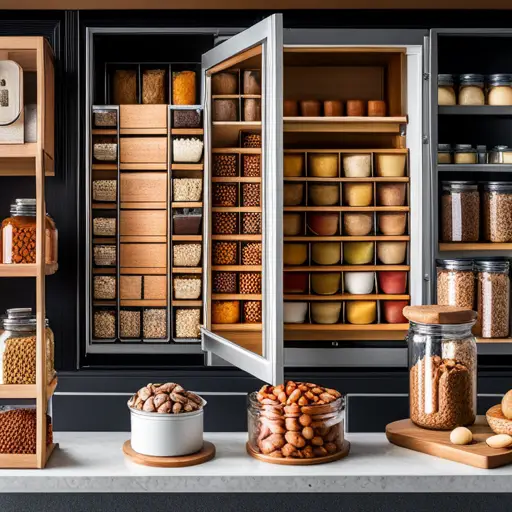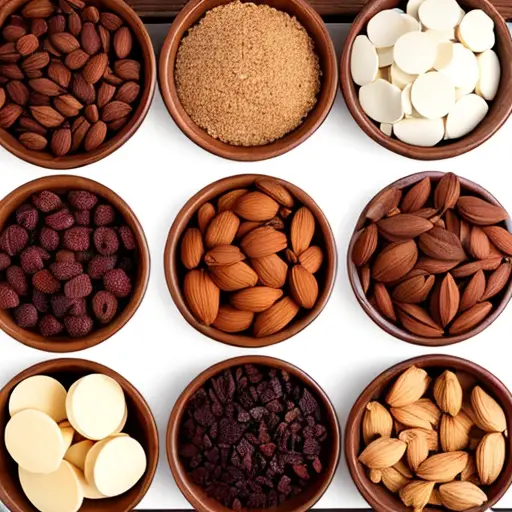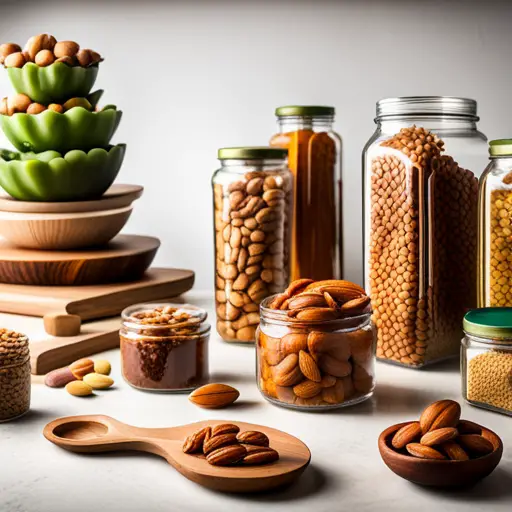When it comes to storing nuts in the pantry, proper storage techniques are crucial to maintaining their freshness, flavor, and nutritional value. Nuts are delicious and packed with essential nutrients, healthy fats, and antioxidants. To ensure that your nuts stay fresh and retain their quality for as long as possible, it’s important to follow the right storage methods. In this article, we will provide you with a comprehensive guide on how to store nuts in the pantry, highlighting the dos and don’ts to preserve their taste and nutritional benefits.
How to Store Nuts in the Pantry?
Storing nuts in the pantry requires attention to several key factors, including temperature, moisture, and exposure to light. Let’s delve into each aspect and discover the best practices for storing nuts effectively.
Temperature: Keep It Cool
Nuts are sensitive to temperature, and the excessive heat can cause them to turn rancid quickly. Store nuts in a cool pantry where the temperature remains consistent to maintain their freshness. Ideally, the pantry should be around 50°F to 70°F (10°C to 21°C). Avoid storing nuts near heat sources such as the stove or oven, as the heat can accelerate their deterioration.
Moisture: Dry and Airtight is Key
Moisture is the nemesis of nuts, as it promotes mold growth and reduces their shelf life. To prevent moisture absorption, store nuts in airtight containers or resealable bags. Ensure the nuts are completely dry before storing them to prevent any condensation inside the container. If you live in a particularly humid environment, consider using moisture-absorbing packets or add a desiccant like rice grains to the storage container to absorb excess moisture.
Exposure to Light: Keep It Dark
Nuts are photosensitive and can become rancid when exposed to light for extended periods. Store nuts in opaque containers or place them in dark pantries away from direct sunlight. Sunlight can degrade the healthy fats in nuts and negatively impact their flavor. Keeping your nuts in a dark environment will help preserve their quality and extend their shelf life.
Packaging: Original or Airtight Containers?
When purchasing nuts, they often come in packaging that may not be ideal for long-term storage. Transferring nuts to airtight containers or resealable bags is recommended for better preservation. Airtight containers prevent air from entering, reducing the chances of oxidation and rancidity. If stored in a dark pantry, transparent containers can still be used to avoid light exposure.
Freezing: An Alternative Storage Method
If you have many nuts or want to extend their shelf life even further, freezing is an effective storage method. Before freezing, ensure the nuts are completely dry and free of any moisture. Place them in airtight containers or freezer bags, removing as much air as possible to prevent freezer burn. When you’re ready to use the nuts, thaw them in the refrigerator overnight to retain their texture and flavor.
How to Extend the Shelf Life of Nuts and Seeds

Nuts and seeds are nutritional powerhouses packed with beneficial fats, protein, vitamins, and minerals. However, due to their high oil content, they can turn rancid quickly if not stored correctly. Proper storage ensures they remain fresh, tasty, and nutritious. Here’s a comprehensive guide to help you maximize the shelf life of nuts and seeds:
1. Store in Airtight Containers
Air exposure speeds up the oxidation process, which can lead to rancidity. Storing nuts and seeds in airtight containers helps minimize their exposure to air, ensuring they remain fresh for longer. Glass jars, plastic containers with tight-fitting lids, or vacuum-sealed bags are excellent choices.
2. Keep Away from Light
Direct sunlight or intense artificial light can degrade the quality of nuts and seeds. Store them in opaque containers or in a dark location like a pantry or cupboard.
3. Cool and Consistent Temperature
Warm temperatures can hasten the spoiling of nuts and seeds. Ideally, store them in a cool, dry place. Consider refrigeration or freezing if you have a large quantity or live in a warm climate.
4. Refrigeration and Freezing
For extended storage:
- Refrigeration: Storing nuts and seeds in the fridge can extend their shelf life to up to a year, depending on the variety.
- Freezing: For long-term storage, freezing nuts and seeds can keep them fresh for up to two years. Ensure they’re sealed tightly in freezer-safe bags or containers to prevent freezer burn.
5. Rotate Stocks
Practice the “first in, first out” principle. Use older stocks first before opening new ones. This rotation ensures you’re consuming nuts and seeds at their freshest.
6. Reduce Moisture Exposure
Moisture can introduce mold and spoilage. Always ensure your hands are dry when handling nuts and seeds, and avoid using damp utensils if scooping directly from their storage container.
7. Store Away from Strong Odors
Nuts and seeds can absorb strong odors. Keep them away from strong-smelling foods like onions or garlic, especially if stored in the refrigerator.
8. Roasting for Preservation
Roasting nuts can extend their shelf life by reducing moisture content and enhancing flavor. However, it’s essential to let them cool completely before storage to prevent moisture build-up in the container.
9. Purchase in Shell
If possible, buy nuts in their shell. The natural shell acts as a protective barrier, keeping the nut fresh for longer. Only shell them when you’re ready to eat or use them.
10. Check Regularly
Inspect your stored nuts and seeds from time to time. If you notice any signs of mold, an off smell, or if they taste rancid, it’s best to discard them.
With proper storage techniques, nuts and seeds can remain a flavorful and nutritious part of your diet for extended periods. Following the above guidelines ensures these nutrient-rich foods remain as fresh as the day you bought them.
Why You Should Store Nuts in the Freezer

Nuts are a staple in many diets due to their nutrient-rich profile, offering a wholesome blend of proteins, healthy fats, vitamins, and minerals. However, their high-fat content means they’re also prone to rancidity, which can compromise both flavor and nutritional value. One excellent solution to this challenge? Storing nuts in the freezer. Here’s why this method is gaining popularity:
1. Preservation of Freshness and Flavor
The cold environment of a freezer dramatically slows down the oxidation process. Oxidation is the primary reason nuts turn rancid. By freezing them, you’re essentially “pausing” this process, ensuring that the nuts retain their fresh taste and aroma for much longer than when stored at room temperature.
2. Extended Shelf Life
Nuts, especially when shelled, have a limited shelf life at room temperature. By contrast, nuts can remain fresh for up to two years when stored in the freezer. This longevity lets you buy nuts in bulk, saving money and store trips.
3. Retention of Nutritional Value
Over time, the valuable nutrients in nuts can degrade. Cold storage helps preserve the nutritional integrity of nuts. Essential fatty acids, vitamins, and antioxidants remain intact when nuts are stored in a deep freeze.
4. Protection Against Pests
Pests, such as weevils and pantry moths, can sometimes infest stored foods, including nuts. Freezing not only makes the environment inhospitable to these pests but can also kill any larvae or eggs that might be present.
5. Reduced Moisture Exposure
Moisture can be a significant adversary for nuts, leading to mold growth and spoilage. The dry environment of a freezer reduces the risk of moisture-related issues, keeping your nuts in optimal condition.
6. Versatility in Usage
A notable feature of frozen nuts is that they thaw rapidly. If you need them for a recipe or a quick snack, take out the required amount and let them sit at room temperature for a few minutes. They’ll be ready to use in no time.
7. Prevents Absorption of Other Odors
The freezer, especially when compared to the refrigerator, is a relatively odor-neutral environment. Storing nuts in the freezer, in airtight containers or bags ensures they don’t absorb unwanted odors, preserving their natural taste.
Storing nuts in the freezer is not just a trend; it’s a practical approach backed by the science of food preservation. The freezer might be your best ally if you want to maintain your nuts’ taste, nutritional profile, and quality over an extended period. Remember always to use airtight containers or vacuum-sealed bags to get the most out of this storage method.
How Long Do Nuts Last?

Nuts are both delicious and nutritious, but like all-natural foods, they have a shelf life. How long nuts last largely depends on the type of nut, its processing method (shelled vs. unshelled, raw vs. roasted), and storage conditions. Here’s a breakdown to give you a clearer picture:
1. General Guidelines
- Raw, Shelled Nuts: At room temperature in a cool, dark place, these can last for around 3 to 4 months. The refrigerator can extend up to 6 months; in the freezer, it can last up to a year or even longer.
- Roasted Nuts: These often have a slightly shorter shelf life than their raw counterparts due to the more exposed oils. Expect them to last about 2 to 3 months at room temperature, up to 6 months in the refrigerator, and a year in the freezer.
- Unshelled Nuts: The natural protective shell can extend the life of nuts. Typically, unshelled nuts can last up to a year if stored in a cool, dry place.
2. Specific Nuts and their Approximate Shelf Lives
- Almonds: 9-12 months in the pantry, up to 1 year in the refrigerator, and longer if frozen.
- Peanuts: 6-9 months in the pantry, 1 year in the refrigerator, and 1-2 years frozen.
- Walnuts: 6 months in the pantry, 1 year refrigerated, and 2 years frozen.
- Cashews: 6-9 months in the pantry, up to 1 year refrigerated, and longer if frozen.
- Pecans: 6 months in the pantry, about 1 year refrigerated, and up to 2 years frozen.
- Macadamia: 6 months in the pantry, 1 year in the refrigerator, and 1-2 years frozen.
- Pistachios: 3 months in the pantry, 1 year in the refrigerator, and up to 3 years in the freezer.
- Hazelnuts: 4-6 months in the pantry, up to 1 year refrigerated, and longer if frozen.
- Brazil Nuts: 9 months in the pantry, 1 year in the refrigerator, and longer if frozen.
- Pine Nuts: 1-2 months in the pantry (due to their high oil content), 3-4 months refrigerated, and 6-9 months frozen.
Tips for Optimal Storage
- Seal Well: Always store nuts in airtight containers or resealable bags to protect against moisture, pests, and oxidation.
- Keep Cool and Dark: Direct sunlight and heat can accelerate the rancidity of nuts. Store them in cool, dark places.
- Limit Exposure: When you open the container, nuts get exposed to air. Try to limit this exposure or consider portioning nuts into smaller batches.
- Check for Freshness: If nuts develop an off smell or appear shriveled or moldy, it’s best to discard them.
Nuts are a fantastic source of nutrition, but like all foods, they have a finite shelf life. By understanding the storage timelines and taking measures to store them correctly, you can enjoy fresh, tasty, and nutritious nuts for as long as possible. Always prioritize quality and safety; rely on your senses to gauge freshness when in doubt.
FAQs
How long can nuts be stored in the pantry?
The storage time for nuts varies depending on the type. Generally, most nuts can be stored in the pantry for up to six months. However, certain nuts like walnuts and pecans, which have a higher fat content, are more prone to spoilage and should be consumed within three months.
Can nuts go bad?
Yes, nuts can go bad if not stored properly. The high oil content in nuts makes them susceptible to rancidity, resulting in a stale taste and unpleasant odor. It’s important to follow the recommended storage guidelines to prevent spoilage.
Can I store different types of nuts together?
It is generally safe to store different types of nuts together as long as they are properly sealed in airtight containers. However, be cautious when mixing nuts with strong flavors, as the aromas can intermingle and affect the taste of the nuts.
Should I refrigerate nuts instead of storing them in the pantry?
While refrigeration can prolong the shelf life of nuts, it can also lead to changes in texture and taste. Refrigeration is unnecessary for most nuts if consumed within a reasonable time frame. However, if you live in a hot and humid climate, refrigerating certain nuts like almonds and pine nuts can help preserve their freshness.
Can I roast nuts before storing them?
It is best to store nuts in their raw form to maintain their optimal freshness. Roasting nuts can accelerate the oxidation process, reducing their shelf life. If you prefer the flavor of roasted nuts, it’s advisable to roast them in small batches as needed.
Can I store nuts in the pantry if they are already shelled?
Yes, you can store shelled nuts in the pantry using the same storage guidelines. However, shelled nuts may have a shorter shelf life than nuts with intact shells. Monitor them closely for any signs of spoilage.
Conclusion
Properly storing nuts in the pantry is essential for maintaining their freshness, flavor, and nutritional value. By following the guidelines outlined in this article, you can ensure that your nuts stay delicious and nutritious for an extended period. Remember to keep the temperature cool, the storage containers airtight, and the pantry dark to preserve the quality of your nuts. And if you ever have any doubts about the freshness of your nuts, trust your senses—when in doubt, throw it out!

